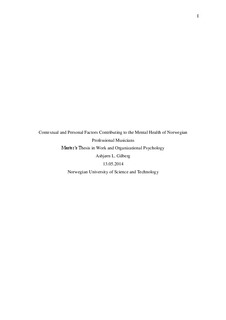Contextual and Personal Factors Contributing to the Mental Health of Norwegian Professional Musicians
Master thesis
Permanent lenke
http://hdl.handle.net/11250/271272Utgivelsesdato
2014Metadata
Vis full innførselSamlinger
- Institutt for psykologi [3085]
Sammendrag
This master’s thesis investigates the contributing factors to Norwegian professional musicians’ psychological distress. Several researchers have pointed out that musicians seem to be a risk group in regards to mental health and work environment. In contrast, research regarding the explanatory variables of their mental health is scarce. Recently, a study indicated a high prevalence of psychological distress in Norwegian musicians. A qualitative study on Norwegian musicians reported a combination of family, social, and personal factors to be of particular importance regarding their mental health. The present study adds to the accumulated research base by conceptualizing contributing factors of musicians’ health in a job demands–resources framework, in which the total model as well as individual predictors are tested with a survey on 1,365 Norwegian professional musicians. Five out of ten hypotheses were supported using a hierarchical multiple regression procedure. Job demands and job control were positively related to psychological distress, whereas job-related social support, emotional stability and sense of mastery were negatively related to psychological distress. Work–nonwork interference, effort–reward imbalance and conscientiousness were not significantly related to the outcome. Unexpectedly, job control was positively related to psychological distress, which may have been influenced by the subjects’ levels of personal resources. Overall, the main findings was that a combination of contextual and personal variables were most influential, but that the work environment concepts investigated were only weakly or non-significantly related to musicians’mental health. The highest single contributors were emotional stability, sense of mastery and general social support, indicating that personal dispositions of emotionality, a strong sense of control over one’s life, and perceived social support from family and friends are of high significance for Norwegian professional musicians’ experience of anxiety and depression-like symptoms.
